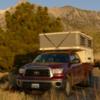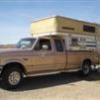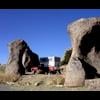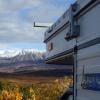
TIPS FOR WINTER STORAGE IN FRIGID COLD
#1

Posted 20 December 2012 - 06:07 PM
I’m facing my first winter with my FWC Hawk. In Wyoming, and it was -8 this morning. The camper will be off the truck, on its jacks, in a large storage tent, protected from winds, snow, and moisture, but not heated. My FWC is old, a 2002 Hawk, but it was hardly used and mostly sat in a storage unit for 10 years.
I am looking for help on,
-Top up on down? Which is best for storage? The tent is plenty high enough to put in either way. Saw same Q reposted today, and unanswered.
-Any recommendations on prep for winter storage?
-Water system? How best to drain securely to store. When I got home a week ago, the exterior drain faucets (both from water tank and sink) had frozen - just from drive home. Cleared sink, but to empty water tank I had to run the pump and let all the water drain from sink. Still not sure that all water is out of lines. I’ve read that RV owners put antifreeze in water lines. I don’t like idea of antifreeze in my water lines. Another choice? Is there concern about water left in the water pump?
-Saw a recent post by bigun on jacks being insufficient for storage. Is that so?
Thanks for any help.
Armando
#2

Posted 20 December 2012 - 06:27 PM
Be careful in you raise or lower the top!!
Warm up the inside first.
~DR
#3

Posted 20 December 2012 - 07:16 PM
I drove with my camper drain valve (including the one for the hot water tank) open for a couple of days ( Water seemed to keep spilling out).
My camper has a valve that redirects flow in to the hot water tank so I was able to block anything from going in by turning the valve.
Poured the Antifreeze in to the Water tank and ran it through the system until the faucet and outside shower head ran pink. From what I understand that if water is left in the pump and it freezes it will damage the pump.
Be careful to take advice from someone who lives in a similar climate as you do. Many of our FWC brethren are not required to go through the same measure as they live in warmer climates. I live in the most northerly Canadian city so I must take in to account that everything freezes and stays frozen for about 6 months.
Putting the antifreeze in was not a big deal - We will see how hard it is to flush out in the spring.
Just my 2 cents.
#4

Posted 20 December 2012 - 07:31 PM
In the spring, after draining the antifreeze and filling the tank with water and draining two times, I sanitize the tank with Thetford's non-bleach sanitizer. After flushing that out the water system is good to go until the next autumn freeze. The sanitizing has nothing to do with the antifreeze - it's just an obvious time to do the yearly cleaning.
'99 Ford Ranger XLT, '08 FWC Eagle
-------------
“the clearest way into the Universe is through a forest wilderness.” - John Muir
#5

Posted 20 December 2012 - 07:56 PM
Didn't we just have a thread about this a little while ago? Anyway, like some others I use my FWC year round and my major problems are finding a water tap that I can use to fill up the water tank that's not frozen up here in snow country before I take off and not forgetting to drain the tanks when I get back home-then hitting the pump switch to get the last of the water out! The FWC stays on my truck year round and so far, despite many winter storms, low temps and other natural and man-made (me) disasters (blown fuses, tank leaks etc.,) I've been lucky in having my water system freeze up only once in the last six years. These campers are allot tougher than you think and keeping up on normal maintenance (water proofing, cleaning systems out, ect.,) seems to keep things working--but again I've been lucky and have learned how to keep my FWC working by surviving my many mistakes and by keeping up on the posts on this site. Thanks guys!
Smoke
#6

Posted 21 December 2012 - 03:02 PM
My hawk has a CO2/propane detector. They draw about .04 amps of current. That is about 1 amp-hour each day or 100 amp-hours in 100 days. I have considered turning mine off (remove fuse?) when my camper is not being used for long periods.
Steve
#7

Posted 21 December 2012 - 03:35 PM
My Hawk has a push-pull switch that turns the entire electrical system off (including the gas sensors -- their LED monitor lights go out)My hawk has a CO2/propane detector. They draw about .04 amps of current. That is about 1 amp-hour each day or 100 amp-hours in 100 days. I have considered turning mine off (remove fuse?) when my camper is not being used for long periods.
FWC Hawk (2005) on a Ford F250 Supercab, 6.8L V10 gas (2000)
#8

Posted 22 December 2012 - 11:15 PM
remove the battery from the cold.
remove the mattress, so air may circulate around that area.
think that just about covers it.
instead of anti freeze you can blow the lines out
#9

Posted 27 December 2012 - 05:17 PM
I added a valve between my tank and pump so I don't add RV antifreeze into my holding tank. I also added valves to isolate the water heater tank (no antifreeze in water heater tank). In the fall, I drain all the water from the tank, lines, and heater. I fill the lines only (includes pump) with RV antifreeze. The RV antifreeze is non-toxic, but I always flush plenty of water through the system in the springtime. In my opinion, you don't need to add antifreeze to tanks because they are empty and they are difficult to clean, and it would be a waste of antifreeze. Every year, I do disinfect the entire system including tanks with bleach (be sure to use correct amount).
No need to put a little antifreeze down the drain also, unless you've added a p-trap. My camper has no p-trap, the drain goes straight down and is always empty - it would simply be a waste of antifreeze.
I use 1/2 gallon of -100F ArcticBan RV antifreeze every fall for the procedure outlined above.
I store the camper with the top down, keep roof cleared of snow (weight will collapse roof), remove battery (correct, a discharged battery will freeze), and stand mattresses on edge in center of camper for improved circulation. I would think that if you wanted to store the camper in the raised top position, within a tented enclosure like you have, that would reduce any chance of mildew on the sidewalls (from condensation or whatever moisture may get in there). Like was mentioned, I avoid raising/lowering the top in "FRIGID" temperatures. I would not want the long term sun-exposure on the fabric however, if it were outside a tented enclosure.
Obviously I don't keep the camper on the truck year round. I built a plywood base for the camper for long-term storage only because I walk in and out of the camper during winterization/start-up. There is absolutely no issue with storing the camper on the Reico jacks. HOWEVER, in my opinion, it is best to have the floor supported when walking in and out of the camper. I try not to walk in the camper when it is up on jacks. Sure, I've done it, and no you're not going to fall through the floor, but I feel better if the floor is supported.
This has been the routine for several years, with no "FRIGID" cold related issues. Best of luck in your winterization efforts.
#10

Posted 05 February 2020 - 03:19 PM
0 user(s) are reading this topic
0 members, 0 guests, 0 anonymous users





















